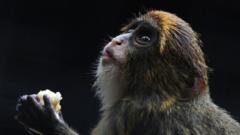Reports suggest that workers excavating soil near the enclosures may have inadvertently introduced the bacteria via their footwear. Dirk Pfeiffer, a veterinary epidemiologist from the City University of Hong Kong, noted that while the risk of the infection spreading to humans is "fairly low," it remains concerning when multiple deaths occur within captive animal populations where such incidents are unprecedented.
The previous 11 monkeys included critically endangered species such as cotton-top tamarins, alongside white-faced sakis and common squirrel monkeys. Authorities have confirmed that these monkeys perished due to melioidosis, an infectious disease caused by the bacterium Burkholderia pseudomallei, which is known to thrive in tropical and sub-tropical environments. Initial findings indicate the twelfth monkey also exhibited similar tissue lesions, consistent with those of the earlier victims.
Despite the alarming situation, officials stated that the remaining 78 mammals in the zoo are currently in good health, although the mammals section has been closed since October 14 for thorough disinfection procedures. The Hong Kong Zoological and Botanical Gardens, the city's oldest park, occupies 14 acres at the center of the metropolis.
Animal rights organization Peta has expressed concern regarding potential zoonotic diseases, such as monkeypox, which could transfer from animals to humans. Peta campaign manager Abigail Forsyth emphasized that preventing the emotional and physical harm to animals is paramount, advocating for the protection of their natural habitats rather than their confinement for entertainment purposes.
The occurrence of melioidosis in Hong Kong is not unprecedented; the first reported case dates back to the mid-1970s, when 24 dolphins in Ocean Park succumbed to the disease.
The previous 11 monkeys included critically endangered species such as cotton-top tamarins, alongside white-faced sakis and common squirrel monkeys. Authorities have confirmed that these monkeys perished due to melioidosis, an infectious disease caused by the bacterium Burkholderia pseudomallei, which is known to thrive in tropical and sub-tropical environments. Initial findings indicate the twelfth monkey also exhibited similar tissue lesions, consistent with those of the earlier victims.
Despite the alarming situation, officials stated that the remaining 78 mammals in the zoo are currently in good health, although the mammals section has been closed since October 14 for thorough disinfection procedures. The Hong Kong Zoological and Botanical Gardens, the city's oldest park, occupies 14 acres at the center of the metropolis.
Animal rights organization Peta has expressed concern regarding potential zoonotic diseases, such as monkeypox, which could transfer from animals to humans. Peta campaign manager Abigail Forsyth emphasized that preventing the emotional and physical harm to animals is paramount, advocating for the protection of their natural habitats rather than their confinement for entertainment purposes.
The occurrence of melioidosis in Hong Kong is not unprecedented; the first reported case dates back to the mid-1970s, when 24 dolphins in Ocean Park succumbed to the disease.

















